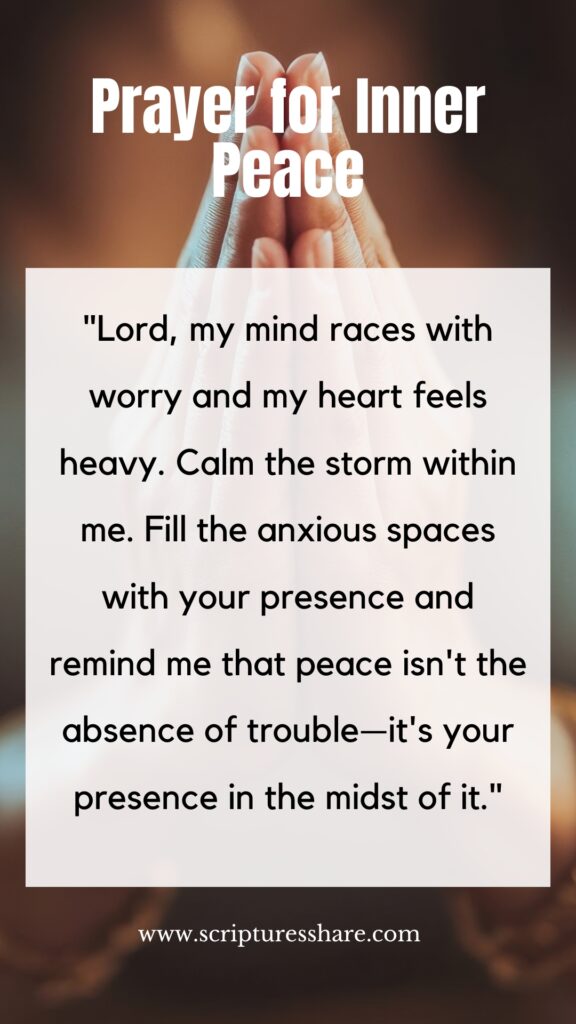No products in the cart.
How To Find Peace In God’s Purposes Everyday
This post contains paid and/or affiliate links. I make a small commission at no extra cost to you. Please see our Privacy Policy.
Peace feels impossible when your plans crumble, relationships struggle, or circumstances spin beyond your control. You know God has purposes for your life, but finding peace in those purposes while living through messy realities requires more than good intentions.
The gap between knowing God has a plan and actually resting in that plan trips up even strong believers. Here’s how to bridge that gap and experience genuine peace with God’s purposes for your life, starting today.
What Does “God’s Purposes” Actually Mean?
God’s purposes operate on multiple levels simultaneously. Understanding these different dimensions helps you find peace even when one area feels chaotic.
Universal Purposes: God’s overarching plan for humanity’s redemption and restoration Personal Purposes: Your specific calling, gifts, and role in God’s larger story
Daily Purposes: How God wants to work through ordinary moments and decisions Character Purposes: Ways God shapes you to become more like Christ Relational Purposes: Your role in loving and serving others around you
Most anxiety about God’s purposes comes from confusion between these levels. You might worry about missing your “life calling” when God is actually working through your current job, marriage struggles, or neighborhood interactions.
5 Daily Practices That Build Peace With God’s Purposes
1. Start Each Morning With Surrender
Peace begins with releasing your agenda to embrace God’s agenda for your day. This doesn’t mean becoming passive, but holding your plans loosely enough that interruptions don’t destroy your peace.
Morning Surrender Prayer: “God, I offer you my schedule, expectations, and goals for today. Show me where you’re already working and how I can join you. Help me respond to unexpected situations as opportunities rather than obstacles.”
Practical Steps:
- Review your daily schedule and ask God to guide your priorities
- Identify one way you can serve others today
- Prepare mentally for schedule changes without losing peace
- Choose gratitude for circumstances you can’t control
2. Look for God’s Work in Ordinary Moments
God’s purposes unfold through regular activities more than dramatic experiences. Train yourself to notice divine appointments in grocery store conversations, work challenges, family interactions, and community needs.

Questions to Ask Throughout Your Day:
- How might God want to use this conversation?
- What character quality is this situation developing in me?
- Who around me needs encouragement or practical help?
- How can I represent Christ’s love in this interaction?
Most people miss God’s daily purposes because they’re waiting for burning bushes instead of noticing the person who needs a kind word or the opportunity to practice patience in traffic.
3. Practice Present-Moment Trust
Anxiety about God’s purposes often comes from trying to understand the entire plan instead of trusting the next step. God rarely shows you the destination, but he always provides enough light for the immediate path.
Present-Moment Trust Techniques:
- When worrying about the future, return attention to today’s responsibilities
- Thank God for guidance you’ve already received
- Focus on being faithful in current circumstances rather than controlling outcomes
- Choose trust over understanding when God’s timing feels slow
Biblical figures like Abraham and Moses received direction one step at a time. You don’t need to see God’s complete plan to experience peace in following his current guidance.
4. Align Your Desires With Scripture
Many people struggle to find peace with God’s purposes because their personal desires conflict with biblical values. Peace comes when your heart increasingly wants what God wants.
Heart Alignment Process:
- Identify desires that create anxiety or frustration when unmet
- Compare these desires with scriptural priorities like love, service, character growth
- Ask God to change desires that oppose his purposes
- Find ways to pursue God-honoring dreams through current circumstances
This doesn’t mean suppressing all personal preferences, but ensuring your deepest longings align with God’s heart for justice, relationships, spiritual growth, and service to others.
5. Build Community Around God’s Purposes
Isolation makes it harder to discern and embrace God’s purposes. Surround yourself with people who can provide perspective, encouragement, and accountability as you seek to live out your calling.
Community Elements for Purpose-Driven Peace:
- Friends who pray for your spiritual growth, not just your comfort
- Mentors who’ve learned to trust God through difficult seasons
- People to serve alongside in meaningful work
- Accountability partners who ask about your character development
Community provides external confirmation of God’s work in your life when your own perspective becomes clouded by circumstances or emotions.
Common Obstacles to Finding Peace in God’s Purposes
Perfectionism and Control
Many people can’t rest in God’s purposes because they want to execute those purposes perfectly. They fear making wrong decisions, missing opportunities, or failing to live up to their calling.
Perfectionism Solutions:
- Remember that God uses imperfect people throughout scripture
- Focus on faithfulness in small things rather than flawless performance
- View mistakes as learning opportunities rather than disqualifications
- Trust God’s sovereignty over your weaknesses and limitations

Comparison With Others
Social media and church culture often promote comparison that destroys peace with your unique purposes. Someone else’s calling, timeline, or circumstances become the standard for measuring your own life.
Comparison Antidotes:
- Celebrate others’ successes without questioning your own path
- Focus on your growth over time rather than comparison with peers
- Remember that God’s purposes for you fit your personality and circumstances
- Practice gratitude for your specific gifts and opportunities
Unclear Direction
Sometimes God’s purposes feel vague or confusing, leaving you unsure about next steps. This uncertainty can create anxiety that robs you of peace in the present moment.
Direction-Finding Strategies:
- Seek wisdom from scripture, prayer, and mature believers
- Take next obvious steps while waiting for clearer guidance
- Experiment with different opportunities to discover your gifts
- Trust that closed doors are as much God’s guidance as open ones
Biblical Examples of Finding Peace in God’s Purposes
Joseph found peace during slavery and imprisonment by trusting that God was preparing him for future leadership, even when circumstances suggested abandonment.
Mary experienced peace after accepting God’s plan for her to bear the Messiah, despite not understanding how everything would work out.
Paul maintained peace during persecution and imprisonment by focusing on how his sufferings advanced the gospel rather than seeking personal comfort.
David learned to rest in God’s timing between his anointing as king and actual coronation, using years of delay to develop character and trust.
Each found peace not by understanding God’s complete plan, but by trusting God’s character and remaining faithful in their current circumstances.

Peace With God’s Purposes During Difficult Seasons
When Plans Fall Apart
Failed plans don’t indicate failed purposes. Often God uses the collapse of your agenda to redirect you toward his better plans.
Responses to Failed Plans:
- Grieve disappointments without questioning God’s goodness
- Look for new opportunities that wouldn’t exist without the change
- Ask what character qualities God might develop through this redirection
- Trust that closed doors protect you from paths that aren’t right for you
When Waiting Feels Endless
God’s timeline rarely matches human expectations. Learning to find peace during waiting periods requires shifting focus from outcomes to character development.
Peaceful Waiting Strategies:
- Serve others while waiting for your own breakthrough
- Develop skills and relationships that prepare you for future opportunities
- Practice contentment in current circumstances while maintaining hope for change
- View waiting as preparation time rather than wasted time
When Circumstances Feel Random
Sometimes life feels chaotic and purposeless. Peace comes from trusting that God can use even random-seeming events to accomplish his purposes in your life and others’.
Finding Purpose in Chaos:
- Look for ways to love and serve others regardless of your circumstances
- Ask how difficult situations might prepare you for future ministry
- Focus on being faithful in small things when big things feel out of control
- Trust God’s ability to weave all experiences into meaningful patterns

Practical Steps for Today
Morning Practice: Spend five minutes asking God to show you his purposes for your day. Look for opportunities to serve others and grow in character.
Midday Check-in: Pause to ask how God might be working through your current activities and interactions.
Evening Reflection: Review your day for moments when you aligned with God’s purposes and times when you resisted them.
Weekly Planning: Dedicate time to pray over your schedule and commitments, asking God to guide your priorities.
Monthly Evaluation: Assess whether your lifestyle choices support or hinder your ability to embrace God’s purposes for your life.
Finding Peace When You Can’t See the Plan
The most profound peace with God’s purposes comes not from understanding his plan, but from trusting his character. When you can’t see where God is leading, you can rest in who God is—loving, wise, sovereign, and good.
This kind of peace doesn’t depend on favorable circumstances or clear direction. It rests on the foundation that God loves you, knows what’s best for you, and has the power to accomplish his purposes through any situation.
Your job isn’t to figure out God’s entire plan for your life. Your job is to trust him today, love the people he’s placed around you, and remain faithful in the responsibilities he’s given you right now.
That’s enough. That brings peace. That’s how you find rest in God’s purposes everyday, even when those purposes remain mysteriously hidden in his perfect wisdom and timing.
Key Takeaways for Daily Peace
- Start with surrender – Release your agenda to embrace God’s plan each morning
- Notice ordinary moments – God works through regular activities more than dramatic events
- Trust the next step – You don’t need to see the whole staircase to take the first step
- Align your heart – Find peace when your desires match God’s priorities
- Build community – Surround yourself with people who encourage your spiritual growth
- Focus on character – God’s primary purpose is making you more like Christ
- Serve others – Purpose often becomes clear through meeting others’ needs
Peace with God’s purposes is available today, in your current circumstances, with your present understanding. You don’t have to wait for perfect clarity or ideal situations to experience the rest that comes from trusting God’s heart for your life.

















